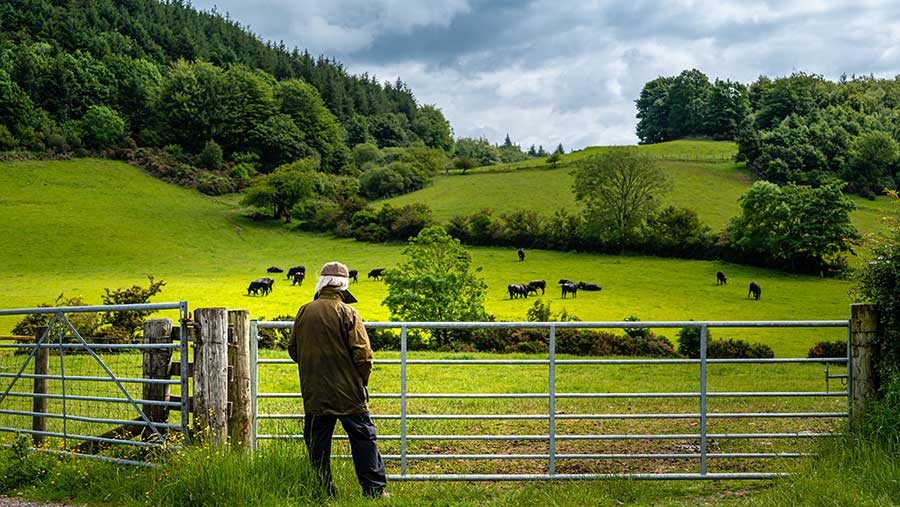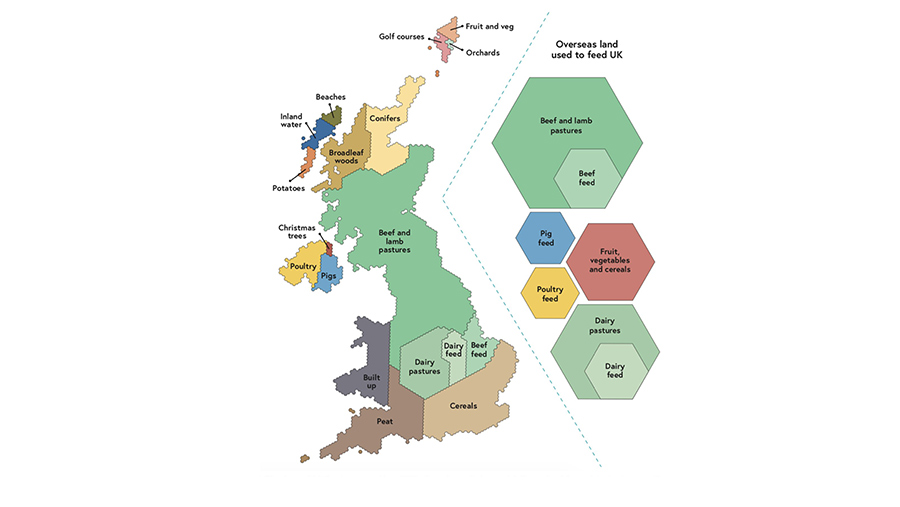Advertiser content
Can woodland solve some of your farming challenges?
The UK must better provide for its own needs and farmers are absolutely essential to its success.
The Covid pandemic, the ongoing war in Ukraine, and the resultant economic uncertainty have all had us thinking about how we can better support ourselves, both nationally, and within our own families.

© Tilhill
We are increasingly debating food security whilst, not so long ago, we were anxious about shortages of wood products, mainly taking the form of a lack of toilet rolls.
The spiralling cost of fencing timber for the farm and other wood products was also causing reason for alarm.
So, how do we best use our land, and, as a nation of farmers (well at least in this audience), do we supply the nation’s needs both in terms of food and timber whilst making a good income for our families and securing the future for the next generation?
How are we currently using the land?

Source: The National Food Strategy, Part II. © Tilhill
71% of the UK’s land total is used for agriculture. Forests and woodland make up only 10% of that figure compared to an average of 40% in other European countries.
Yes, we only produce around 55% of the food we eat in the UK but for wood, the situation is even worse with nearer 80 % of our timber being imported.
We hear the argument ‘you can’t eat trees’. Not entirely true, trees can have edible elements, but we can’t live in houses made of food either. Both home-grown food and wood are essential for the UK’s resilience to global crises.
We need wood for so much more than sheds and fencing or even the pallets we use to help transport our food around, wood provides us with our homes and their furnishings too.
There is, as with most things, a balance to be struck. With global timber demand set to quadruple by 2050 and given the commitment to promote an increased use of timber in construction as part of the UK’s Net Zero Strategy, domestic demand for timber is also most likely to increase.
Shortage equals opportunity
That land that you may struggle to farm traditionally, that’s not really doing much for food production and probably not adding much to your income and, if you really gave it a hard clinical analysis, might even be costing you money, could very likely produce a much better return for you as a woodland.
What are the options to turn the more challenging land on your farm into something really financially productive?
Selling
Yes, this might seem like the last resort but that land that’s not adding much, if anything, to your business could offer a way to raise capital that can be used to help diversify or improve the rest of your farm business.
There is strong demand and attractive prices on offer for land across the country for woodland creation and rewilding projects.
Selling some land is a decision that could have big rewards releasing capital to reinvest in the more productive areas of the farm, making management easier and actually helping you increase the output and profit from the remaining land.
We are seeing areas of more than 45 acres getting the strongest interest and we have buyers waiting. Whatever the size of the area that you have an inkling might just be perfect for someone to develop.
Tilhill’s Forestry Investment Advisors can give you great advice and can help you find the very best offer.
Woodland creation
Why not keep the land and do it yourself?
Generous funding is available for farmers to plant new woodlands and this can offer very good returns both now and in the future.
Speak to Tilhill’s professional forest managers in your area to discuss your land and the opportunities it presents.
Professional management is essential to ensure you’re creating a valuable asset for the future.
We can help you with all aspects of creating woodland on your land. From understanding any cashflow challenges, helping with the design, applying for grants and managing all the planting works.
We’ll support you for the long term, organising tree maintenance and protection. We can be there for all the advice you may need.
Natural Capital
Creating new woodland can open the door to woodland-generated carbon credits that you can sell to companies looking to offset their residual carbon emissions.
As the woodland owner, you are in the driving seat. You can retain the carbon credits as an investment, sell all or part of the available units immediately or use them yourself for offsetting your farm’s own residual carbon footprint.
Whatever options you choose, our professional foresters work with our carbon specialists at CarbonStore and can help you to register, validate and verify your scheme under the Woodland Carbon Code.
If you choose to sell, they can help ensure a fair price for your carbon units from environmentally conscious organisations.
This allows you to earn additional income from your woodlands’ natural capital while helping others achieve their net zero goals.
Have you thought about agroforestry?
Just 3% of farms in the UK currently practice agroforestry – this is where trees and shrubs are integrated within a farm to enhance productivity.
Livestock can be integrated with trees, this includes cattle, sheep and pigs. It is a nature-based solution that can promote ecological, economic and social benefits.
Agroforestry has the potential to increase wildlife, enhance the soil and improve the welfare of livestock through providing cover from extreme temperatures alongside climate change and flood mitigation to name a few.
Evidence also suggests that agroforestry can increase agricultural crop productivity, through prevention of environmental degradation, increasing carbon sequestration and generating cleaner water whilst providing a stable income.
Hedging
As tree specialists, we are professionals when it comes to hedging too. There are attractive grants to support hedging and with the hedgerow carbon code launching soon this is another way to benefit from the natural capital opportunities on your farm.
We hope you will agree that there is space for trees and woodland on most farms and many benefits to be gained as a result. Do give us a call so we can help you to explore your opportunities.
For more information please email Simon on simon.marrington@tilhill.com or call: +44 07825 193278 to discuss your farm business.
Visit tilhill.com for more information on how we can help you and your farm business.
Provided by
Tilhill Forestry offers farmers a professional one-stop service for selling woodland generated carbon units, woodland creation, management, and timber harvesting. We help farmers get even better value from otherwise less productive land.
